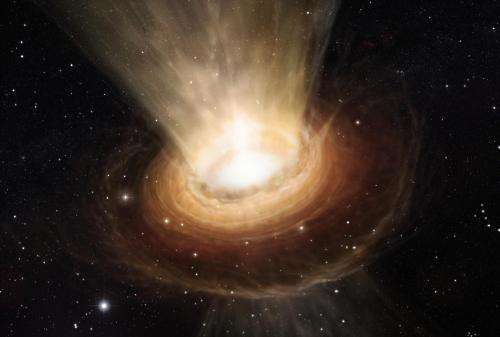April 6, 2015 report
Best of Last Week—Black holes don't erase information, a stick computer and the exploding head syndrome

(Phys.org)—It was another good week for physics as a team of researchers with the University of Waterloo found that a photon "afterglow" could transmit information without transmitting energy—though the receiver must expend energy to read that information. Also good news for physicists trying to solve the "information loss paradox"—a team of researchers has found a way to show that black holes don't erase information—they claim that interactions between particles emitted by a black hole can be used to reveal information about material that "disappeared" inside of it. Also a team of researchers in China has for the first time performed machine learning on a photonic quantum computer—and claim it could speed up the rate at which certain machine learning tasks are performed.
New technology made news this week as well—Microsoft announced a cheaper version of the Surface Pro 3 tablet—they are selling it for $499. Meanwhile at UCLA's California NanoSystems Institute, a team of researchers announced that they had created quick-charging hybrid supercapacitors that can store large amounts of energy, recharge quickly and last for more than 10,000 charge/recharge cycles—perhaps offering a way to keep portable devices running longer. Also another team at Caltech announced that they had developed a camera chip that provides superfine 3-D resolution. They claim that someday soon it could be used to allow a smartphone to take a picture of something and then have that thing replicated on a 3D printer to a resolution of mere microns. Also Google unveiled an Asus made "stick" computer. Called the Chromebit. It is a full computer and is smaller than a candy bar; it can be plugged into a computer monitor to create a complete system.
In other news, a team of researchers at the University of Central Florida reported that a simple $1 test outperforms PSA screening for prostate cancer—the team has developed the test and claim it also provides results in just minutes. Also, another team of scientists discovered the elusive secret of how continents were formed.
And finally, if you have heard rumors about something called "exploding head syndrome," believe them: A team of researchers has found that it exists and is actually quite common in young people. It is where a person experiences a loud noise inside their head just as they are falling asleep, jarring them awake and causing anxiety. A team of researchers found that approximately 18 percent of college teens had experienced it at least one time.
© 2015 Phys.org





















